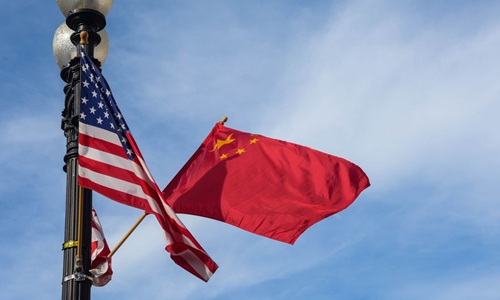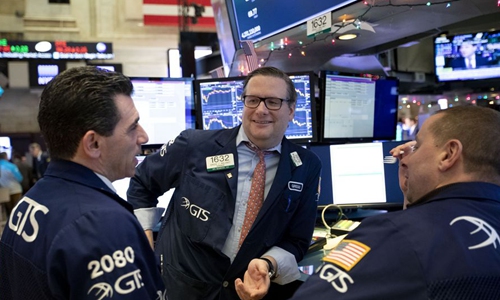HOME >> SOURCE
World markets buoyed as investors gain confidence from China-US phase-one trade deal
Source:Xinhua Published: 2019/12/18 14:09:04

Photo taken on Sept. 24, 2015 shows the national flags of China (R) and the United States on the Constitution Avenue in Washington, capital of the United States.(Xinhua/Bao Dandan)
US stocks rallied as major European and Asian markets were also lifted in the first two days of the week, after investor sentiment was buoyed by China and the United States announcing a phase-one economic and trade agreement last weekend.
China and the United States have agreed on the text of a phase-one economic and trade agreement based on the principle of equality and mutual respect, and reached consensus that the US side will fulfill its commitments to phase out its additional tariffs on Chinese products, according to a statement by the Chinese side late Friday.
On Monday, US stocks closed higher as investor confidence increased following the news of the trade deal.
The Dow Jones Industrial Average was up 100.51 points, or 0.36 percent, to 28,235.89. The S&P 500 increased 22.65 points, or 0.71 percent, to 3,191.45. The Nasdaq Composite Index rose 79.35 points, or 0.91 percent, to 8,814.23.

Traders work at the New York Stock Exchange in New York, the United States, on Dec. 13, 2019. (Xinhua/Wang Ying)
Driven by the positive effect from British Prime Minister Boris Johnson's election victory, the FTSE 100 index on Monday rose 2.25 percent in the largest single-day gain since late December 2018, while the FTSE 250 reported a record 1.9 percent increase.
German stocks were off to a good start on Monday, with the benchmark DAX index rising 67.14 points, or 0.51 percent, opening at 13,349.86 points. The DAX index closed at 13,407.66 points, gaining 124.94 points, or 0.94 percent.
On Tuesday, Tokyo stocks opened higher following record closing highs on Wall Street overnight. As of 9:15 a.m. (GMT 1215), the 225-issue Nikkei Stock Average gained 96.10 points, or 0.40 percent, from Monday to 24,048.45.
Meanwhile, the broader Topix index of all First Section issues on the Tokyo Stock Exchange rose 4.90 points, or 0.28 percent, to 1,741.77.
Hong Kong stocks gained 122.60 points, or 0.45 percent, to open at 27,630.69 points on Tuesday.
The benchmark Korea Composite Stock Price Index or KOSPI jumped 1.54 percent Friday, amid high expectations for the phase-one trade agreement between China and the United States, South Korea's top two trading partners. The index shed 0.1 percent Monday on demand for profit-taking.

People visit the booth of Boston Scientific during the second China International Import Expo (CIIE) in Shanghai, east China, on Nov. 7, 2019. A total of 192 U.S. companies participated in the expo, an increase of 18 percent over last year. The floor space of U.S. exhibition area reached 47,500 square meters, taking up the largest exhibition area among all participating countries. (Xinhua/Fan Peishen)
Seol Tae-hyun, an analyst at South Korea's DB Financial Investment, said that if the phase-one deal is implemented, expectations for a global economic recovery will have a positive impact on the local stock market.
"There is no reason to negatively view the phase-one deal. It is already known to markets and the stock market index advanced high," he told Xinhua.
Also on Tuesday, the Australian share market lifted at opening, with consumer and tech stocks offsetting an underperforming financial sector. Shortly after the opening, the broader All Ordinaries index was up 15.60 points or 0.22 percent at 6,967.90.
Oil prices extended gains on the hope that the China-US deal might raise demand.
On Monday, the West Texas Intermediate for January delivery settled 14 cents higher at 60.21 US dollars a barrel on the New York Mercantile Exchange. Brent crude for February delivery rose 12 cents to close at 65.34 dollars a barrel on the London ICE Futures Exchange.
"Buoyancy is being generated by optimism about the economy, rising stock markets worldwide in view of the 'Phase one deal' in the trade dispute between China and the United States, and a weak US dollar," Eugen Weinberg, energy analyst at Commerzbank Research, said.
Posted in: ECONOMY